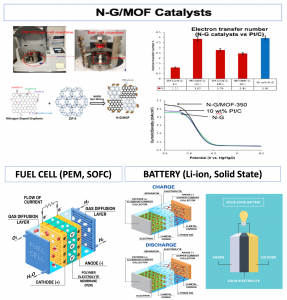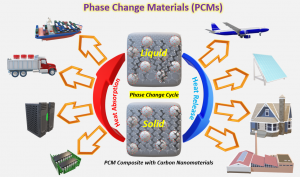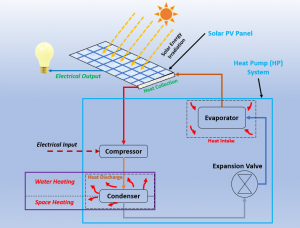RESEARCH PROJECTS
 Graphene-based Nanomaterials for Electrochemical Energy Systems
Graphene-based Nanomaterials for Electrochemical Energy Systems
– Nitrogen-doped Graphene & Graphene-MOF nanomaterial research
– Stability of the new set of nanomaterials for electrochemical reactions
– Half-cell/Single-cell characterization of performance stability research
– Cells, Module, and System characterization study
Project Description:
Advanced Energy Systems and Microdevices Laboratory’s energy researches are focused on the new synthesis and characterization of nitrogen-doped graphene nanomaterials for electrochemical energy systems and industrial applications, including the nanoelectrode materials for batteries (Li-ion and Solid State Batteries) and non-platinum group metal catalysts for fuel cells and electrolyzers (PEM, SOFC, Electrolyzer) and their applications. New graphene-based nanomaterials have a huge potential due to the very low raw material cost compared to other precious materials in many applications spanning from catalytic devices in filtering systems or petroleum processing systems to electrochemical systems such as fuel cells or metal-air batteries. The major research activities of the lab include 1) synthesizing new graphene-based nanomaterials for new energy systems from the sources of carbon materials (eg. Graphene) with the addition of nitrogen, transition metals, and porous materials to modify the characteristics and enhance the electrochemical performance of the synthesized nanomaterials, 2) characterizing the physical, chemical and electrochemical properties of the newly synthesized catalysts by XPS, Raman, SEM, TEM, XRD, RRDE and electrochemical testing station, and 3) investigating the reaction mechanism of the newly synthesized catalysts through experimental methods for a fundamental understanding of the reaction mechanism. We are getting research support from or collaborating with Brookhaven National Laboratory- Center for Functional Nanomaterials (CFN), Princeton University – The Princeton Institute for the Science and Technology of Materials (PRISM), Rutgers XPS facility center, Montclair State University – Material Characterization Laboratory and NJIT Otto York Center for Material characterizations for a top-notch technology supports for characterizations. The research will provide a substantial pathway to the new cost-effective and fuel-efficient energy conversion system for the next-generation energy society.

Nano Biochip for disease detection, diagnosis, and monitoring
– Biochip projects for detections of multiple biomarkers in a single chip
– Self-separation of plasma from whole blood flow in a unique straight microchannel (no pump and no centrifugal or gravitational forces)
– microscale flow dynamics with fluid and particle interactions. (gel particles)
– Nanofluidics on nanoimprinting applications
Project Description:
We are also applying the micro and Nano technology and new materials to the research for biochip microdevices for non-invasive disease detection and diagnosis using both innovative sensing technology and unique microchip design developed in the lab, with collaborations with researchers at nearby medical research centers and Brookhaven National Laboratory. Cancer is one of the major causes of non-accidental death in humans. Early detection and diagnosis of the disease allow clinicians to take suitable treatment and improve the patient’s survival rate. The micro biochip helps to diagnose cancer at earlier stages with its innovative and state-of-the-art ‘sensing technology’- to identify the existence of cancer antibodies in the micro-volume of the blood samples. When the blood flows through the micro channels of the biochip, the cancer antigens interact with the pre-coated cancer antibodies in the microchannel. The biochip detects the existence of antigens by sensing the antigen-antibody interaction. The sensing technology provides both qualitative and quantitative results of cancer antigens in blood sample. Thus we can diagnose both the existence and the severity of cancer using the micro biochip. The institutes collaborated in this research are Princeton University, Princeton Institute for the Science and Technology of Materials (PRISM), NNIN- National Nanotechnology Infrastructure Network (Penn State University), BNL-Brookhaven National Laboratory, CUNY Advanced Science Research Center, Hackensack Medical Centers and Weill Cornell Medical School and NJIT MFC-Micro fabrication Center.
Abonics, Inc. spun off from this research in May 2018 has been pursuing external funding from federal agencies, private foundations, and angels.
 Phase Change Materials (PCMs) – Thermal Property and Stability Improvement
Phase Change Materials (PCMs) – Thermal Property and Stability Improvement
– Development of PCMs for different temperature ranges
– Improvement of thermal properties of PCMs
– Investigation of molecular structures of PCMs for thermal property enhancement
– Eutectic approach for low-temperature rage PCMs design
– Graphene-based Nanomaterials integrated PCMs
– Metal-organic Frameworks (MOFs) integrated PCMs
– Bio-product-based materials integrated PCMs
Project Description:
This project aims to develop Phase Change Materials (PCMs) applicable in different temperature ranges, between -80 to 180 °C, for a wide range of industrial applications including cold storage, domestic temperature control, thermal management of temperature-sensitive industrial and bio-products during transportation, delicate electrical and electronic device thermal management, etc. A major focus is invested in enhancing the thermal properties of PCMs through novel formulation and synthesis approaches, including the investigation of molecular structures to optimize thermal performance. A eutectic approach is being implemented to design PCMs suitable for low-temperature applications, facilitating efficient thermal energy storage and release. The project also focuses on the integration of graphene-based nanomaterials into PCMs to leverage their exceptional thermal conductivity and enhance overall performance. Additionally, Metal-Organic Frameworks (MOFs) and bio-based materials are also being investigated as potential additives/supports to further augment the thermal properties and stability of PCMs, unlocking new possibilities for energy-efficient thermal management systems. Through interdisciplinary research and collaboration, this project aims to propel the development of advanced PCMs with improved performance and versatility for a wide range of applications.
 Solar Photovoltaic (PV) and Heat Pump Integrated Thermal and Power System
Solar Photovoltaic (PV) and Heat Pump Integrated Thermal and Power System
– Heat generation analysis and quantification from solar PV panel
– Analysis of efficiency and power consumption of heat pump system
– Thermodynamic analysis of solar PV – heat pump integrated system
– Cost-effectiveness analysis of solar PV – heat pump integrated system
Project Description:
This research project is dedicated to exploring the multifaceted realm of solar energy utilization and its integration into household heating systems. Our approach encompasses a quantitative analysis of solar energy conversion, examining the efficacy of solar photovoltaic (PV) panels in generating both electricity and thermal energy across various geographic locations and seasons. Through systematic investigation, we seek to utilize the thermal energy collected from solar PV panels and use it in domestic heat pump systems, thus unlocking new avenues for sustainable energy harnessing. Additionally, we are investigating the aspects of household energy consumption by analyzing the energy usage and efficiency of heat pump systems. By employing an interdisciplinary approach, currently, we are working to quantify the energy gain and efficiency enhancements achieved through the integration of solar, and heat pump systems. In a broader view, this project is focused on integrating different renewable energy systems, aiming to optimize energy utilization and foster sustainability.
 Flow and Thermal Management for Energy Systems
Flow and Thermal Management for Energy Systems
Microfluidics in micro- and nano-scale flow
– Porous-Wall MicroChannel Flow and Thermal Analysis
– Fluid and thermal systems analysis: battery and fuel cell
– Electrochemical energy conversion technology: battery and fuel cell
– Thermal characterization study
– Microscale thermo-fluid and imaging
– Optical imaging and flow dynamics analysis
– Experimental and Numerical investigations on flow and heat transfer in energy and electronic devices
Project Description:
The need for flow characterization and thermal management are increasing with the reduced sizes but increased energy density and increased power consumption rate not only in small electronics as predicted by Moore’s law but also in megawatt power plant systems. To successfully control the high energy-density systems, not only air cooling but also liquid cooling is adapted, and those cooling methods require a precise physical understanding of flow dynamics and thermal phenomena with innovative flow and thermal design factors. The main objectives of the research are (1) to understand the flow behaviors including the flow regime on the diverse flow conditions and liquid water drop dynamics and frictional characteristics, and (2) to analyze heat transfer characteristics of the gas phase and gas-liquid two-phase flow in the porous and solid microchannels, and (3) to characterize the cooling enhancement and the performance factors in microchannel and microporous channel flow with and without electro-osmotic effects.
